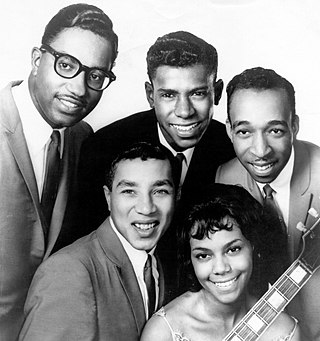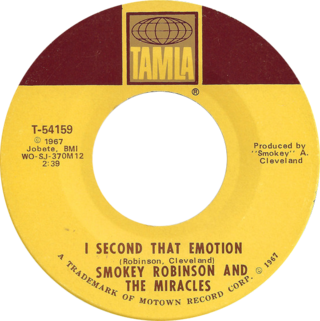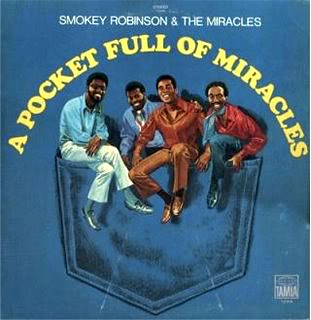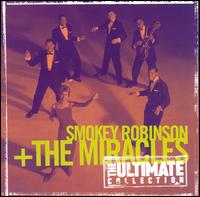
The Miracles were an American vocal group that was the first successful recording act for Berry Gordy's Motown Records, and one of the most important and most influential groups in the history of pop, soul, R&B and rock and roll music. The group's international fame in the 1960s, alongside other Motown acts, led to a greater acceptance of Rhythm & Blues and pop music in the U.S., with the group being considered influential and important in the development of modern popular music.

"I Second That Emotion" is a 1967 song written by Smokey Robinson and Al Cleveland. First charting as a hit for Smokey Robinson and the Miracles on the Tamla/Motown label in 1967, "I Second That Emotion" was later a hit single for the group duet Diana Ross & the Supremes and the Temptations, also on the Motown label.

Going to a Go-Go is a 1965 album by the Miracles, the first to credit the group as Smokey Robinson and the Miracles. It includes four of the Miracles' Top 20 hits: "Ooo Baby Baby", "The Tracks of My Tears", "Going to a Go-Go", and "My Girl Has Gone". It was produced by Miracles lead singer Smokey Robinson, along with Frank Wilson and William "Mickey" Stevenson.
"Going to a Go-Go" is a 1965 single recorded by The Miracles for Motown's Tamla label.

Greatest Hits, Vol. 2 is the second greatest hits album for The Miracles, released in 1968 on Motown Records' Tamla label. It contained the most popular singles from the successful Going to a Go-Go, Away We A Go-Go and Make It Happen albums of the 1965–1967 period. It also featured the 1964 non-album single "Come On Do The Jerk", and two B-sides, "Choosey Beggar" and "Save Me". The hit single "I Second That Emotion" was new to the album. This album reached the Top 10 on the Billboard 200 albums chart, peaking at #7, and peaked at #2 on Billboard's R&B album chart. Ten of the albums' 12 songs were written by Miracles members Smokey Robinson, Pete Moore, Marv Tarplin, Bobby Rogers, and Ronnie White.

Hi... We're the Miracles is the first album by The Miracles, Motown's first group, released on Motown's Tamla subsidiary label in January 1961. It was the first album released by the Motown Record Corporation. The album features several songs that played an important role in defining The Motown Sound and establishing songwriters Smokey Robinson and Berry Gordy.

Greatest Hits from the Beginning is a compilation double LP by The Miracles released in 1965. This was the first double album ever released by the Motown Record Corporation. It covers most of the group's hits from their pre-1965 albums, such as "Shop Around", "Who's Lovin’ You", "You've Really Got A Hold On Me" and "Mickey's Monkey", as well as the non-album singles from 1964: "I Like It Like That" and "That's What Love Is Made Of". The album was a success, reaching #21 on the Billboard Pop Album Chart. It was also the first Miracles album to chart on the Billboard R&B Album chart, where it was an even bigger success, peaking at #2.

"More Love" is a 1967 hit single recorded by the American soul group The Miracles for Motown Records' Tamla label. The single, included on the group's 1967 album Make It Happen, later reissued in 1970 as The Tears of a Clown. Kim Carnes's 1980 cover of the song reached the Top 10 of Billboard's Adult Contemporary and Hot 100 charts.
"My Girl Has Gone" is a 1965 R&B single recorded by The Miracles for Motown's Tamla label. Included on their 1965 album Going to a Go-Go, "My Girl Has Gone" was the follow-up to the group's number 16 Billboard Hot 100 million-selling hit "The Tracks Of My Tears".
"The Love I Saw in You Was Just a Mirage" is a 1967 song recorded by the American R&B group The Miracles on Motown Records' Tamla label. Written by Miracles members Smokey Robinson and Marv Tarplin and produced by Robinson, it is noted for being the first single to bill the group as "Smokey Robinson" & the Miracles, a billing already present on the group's albums by this time. Miracles members Smokey Robinson and Pete Moore were the song's producers.

"I'll Try Something New" is a song written by Smokey Robinson and originally released in 1962 by The Miracles on Motown Records' Tamla subsidiary label. Their version was a Billboard Top 40 hit, peaking at #39, and just missed the Top 10 of its R&B chart, peaking at #11. The song was released later as a joint single by Diana Ross & the Supremes and The Temptations, also becoming a charting version on the Billboard 100 pop singles chart, peaking for two weeks in April 1969 at number 25.
"Way Over There" is a 1960 Motown soul song and single, written by William "Smokey" Robinson, produced by Berry Gordy, and first performed by The Miracles for the Tamla (Motown) label. It was one of The Miracles' earliest charting singles, reaching #94 on the Billboard Pop chart. Motown president Berry Gordy, Jr. had The Miracles record the song several times during its chart run. The first version had minimal orchestration. The second version added strings, and this is the version played by most oldies stations today. Claudette Robinson had several lead parts on this song, answering Smokey's leads with chants of "Come to me, Baby". The song's B-side, "(You Can) Depend on Me", while not charting nationally, did become a popular regional hit in many areas of the country, and Smokey still sings it in his live shows today. "Way Over There" was subsequently recorded by Edwin Starr, The Temptations, The Marvelettes, The Royal Counts, The Spitballs, and Eddie Adams Jr, while "(You Can) Depend on Me" was later recorded by The Temptations, The Supremes, Mary Wells, and Brenda Holloway. The song was also used for the title of Hip-O Select's 2009 compilation: The Miracles – Depend on Me: The Early Albums, which collects the first five LP releases by the group.
"I Like It Like That" was a 1964 hit song by Motown group The Miracles on its Tamla label subsidiary. This is not the Chris Kenner hit song of the same name but a Miracles original, written by Miracles members Smokey Robinson and Marv Tarplin, and is included on the group's first greatest hits album, Greatest Hits from the Beginning. It was also the title song from their deleted 1964 album of the same name.

Renaissance is a 1973 album by R&B group The Miracles on Motown Records' Tamla label. It was the first album by the group not to feature original lead singer Smokey Robinson on lead vocals, instead featuring him as executive producer. Robinson was replaced by lead singer Billy Griffin.
"That's What Love Is Made Of" is a 1964 hit song by Motown's original vocal group, the Miracles, issued on the label's Tamla records subsidiary. It was taken from the group's album Greatest Hits from the Beginning, but originally appeared on their abortive 1964 album, I Like It Like That.
"Choosey Beggar" was a 1965 song recorded by Motown R&B group the Miracles on its Tamla label subsidiary. It was issued as the B-side of the group's top-20 million-selling single, "Going to a Go-Go", and was taken from the group's Billboard Top 10 Pop album of the same name.
"Come On Do the Jerk" was a 1964 song recorded by R&B group the Miracles on Motown Records' Tamla label subsidiary. It was co-written by Miracles members Pete Moore, Bobby Rogers and Smokey Robinson and drummer Donald Whited. A single-only release, it did not appear on any original Miracles studio album, and was the group's last single release of 1964. Robinson and fellow Miracle Bobby Rogers were the song's producers. The flip side, "Baby Don't You Go", was also a popular regional hit but was not released on CD until The 35th Anniversary Collection in 1994. Both sides of this single received new stereo mixes for the 2002 compilation Ooo Baby Baby: The Anthology.

A Pocket Full of Miracles (TS306) is a 1970 album by Motown Records R&B group The Miracles, issued on its Tamla subsidiary label, one of three albums the group released that year. This album charted at #56 on the Billboard pop albums chart, and reached the top ten of the magazine's R&B albums chart, peaking at #10. It was released on September 30 of that year. Hit singles on the album included "Point It Out" and the topical Ashford & Simpson written-and-produced song "Who's Gonna Take the Blame", a sad, dark song about a girl that is turned out as a prostitute. Also included is the charting flip side "Darling Dear", B-side of "Point It Out", which reached #100 on the Billboard pop chart, and spawned a cover version by The Jackson Five.
"(You Can't Let the Boy Overpower) The Man in You" is a 1964 R&B song by the Miracles on Motown Records' Tamla subsidiary label. It was written by Miracles lead singer Bill "Smokey" Robinson, and was produced by Robinson and Motown president/founder Berry Gordy Jr. One of several gospel-styled call and response tunes the group issued in 1964, this song reached number 59 on the Billboard Pop chart, and the top 20 of the Cash Box R&B chart, peaking at number 12. The song was recorded on August 17, 1963, and was the group's first single release of 1964.
"A Love She Can Count On" is a 1963 hit single by Motown Records R&B group the Miracles, issued on that label's Tamla subsidiary label. It was taken from their album The Fabulous Miracles, and was the follow-up to the group's million-selling Grammy Hall of Fame inducted tune, "You've Really Got A Hold On Me". The first of three singles released by The Miracles that year, this song was a Billboard Top 40 Pop Hit, peaking at number 31, and missed the Top 20 of its R&B chart by only one position, peaking at number 21.










